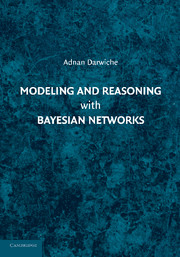Book contents
- Frontmatter
- Contents
- Preface
- 1 Introduction
- 2 Propositional Logic
- 3 Probability Calculus
- 4 Bayesian Networks
- 5 Building Bayesian Networks
- 6 Inference by Variable Elimination
- 7 Inference by Factor Elimination
- 8 Inference by Conditioning
- 9 Models for Graph Decomposition
- 10 Most Likely Instantiations
- 11 The Complexity of Probabilistic Inference
- 12 Compiling Bayesian Networks
- 13 Inference with Local Structure
- 14 Approximate Inference by Belief Propagation
- 15 Approximate Inference by Stochastic Sampling
- 16 Sensitivity Analysis
- 17 Learning: The Maximum Likelihood Approach
- 18 Learning: The Bayesian Approach
- A Notation
- B Concepts from Information Theory
- C Fixed Point Iterative Methods
- D Constrained Optimization
- Bibliography
- Index
2 - Propositional Logic
Published online by Cambridge University Press: 23 February 2011
- Frontmatter
- Contents
- Preface
- 1 Introduction
- 2 Propositional Logic
- 3 Probability Calculus
- 4 Bayesian Networks
- 5 Building Bayesian Networks
- 6 Inference by Variable Elimination
- 7 Inference by Factor Elimination
- 8 Inference by Conditioning
- 9 Models for Graph Decomposition
- 10 Most Likely Instantiations
- 11 The Complexity of Probabilistic Inference
- 12 Compiling Bayesian Networks
- 13 Inference with Local Structure
- 14 Approximate Inference by Belief Propagation
- 15 Approximate Inference by Stochastic Sampling
- 16 Sensitivity Analysis
- 17 Learning: The Maximum Likelihood Approach
- 18 Learning: The Bayesian Approach
- A Notation
- B Concepts from Information Theory
- C Fixed Point Iterative Methods
- D Constrained Optimization
- Bibliography
- Index
Summary
We introduce propositional logic in this chapter as a tool for representing and reasoning about events.
Introduction
The notion of an event is central to both logical and probabilistic reasoning. In the former, we are interested in reasoning about the truth of events (facts), while in the latter we are interested in reasoning about their probabilities (degrees of belief). In either case, one needs a language for expressing events before one can write statements that declare their truth or specify their probabilities. Propositional logic, which is also known as Boolean logic or Boolean algebra, provides such a language.
We start in Section 2.2 by discussing the syntax of propositional sentences, which we use for expressing events. We then follow in Section 2.3 by discussing the semantics of propositional logic, where we define properties of propositional sentences, such as consistency and validity, and relationships among them, such as implication, equivalence, and mutual exclusiveness. The semantics of propositional logic are used in Section 2.4 to formally expose its limitations in supporting plausible reasoning. This also provides a good starting point for Chapter 3, where we show how degrees of belief can deal with these limitations.
In Section 2.5, we discuss variables whose values go beyond the traditional true and false values of propositional logic. This is critical for our treatment of probabilistic reasoning in Chapter 3, which relies on the use of multivalued variables.
- Type
- Chapter
- Information
- Modeling and Reasoning with Bayesian Networks , pp. 13 - 26Publisher: Cambridge University PressPrint publication year: 2009



